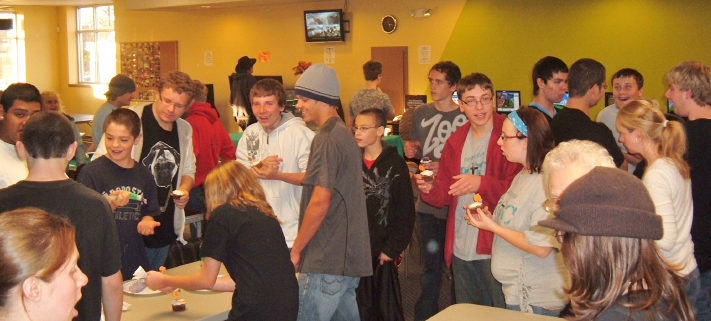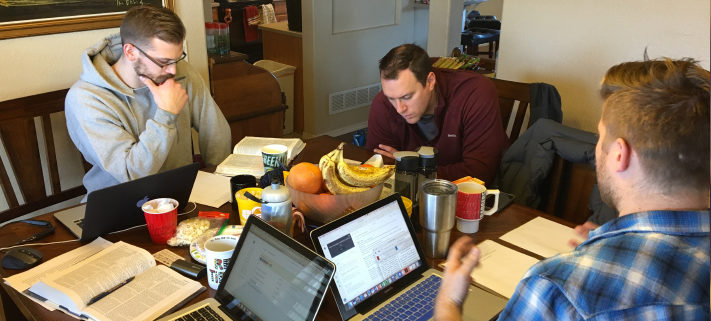How are you saved? Lutherans in our circles find that an easy question to answer: By grace alone.
James G. Kiecker
It’s easy for us to say now, “I’m saved by grace alone,” but it wasn’t always so easy. When Martin Luther came on the scene five hundred years ago, theologians and scholars had been debating about this for at least a thousand years. They all believed that grace was necessary for salvation, but at the same time, it was assumed that a person’s efforts to do good were also needed.
The question became how much grace from God does a person have to add. Some said God contributed a lot of grace and humans only did a little. Others said that salvation was mostly by human effort with God adding only the finishing touch. One prominent theologian in the 1400s stated boldly: “To those who do what they can, God does not deny grace.” Most theologians settled somewhere in the middle, saying both grace and good works were necessary.
Between 1515 and 1518 Luther studied the Scriptures and learned that grace alone, not good works, saves. Armed with the Bible’s answer, Luther wrote a number of books criticizing many of the abuses in the church. First, he wrote to the German nobles and said that since the church wasn’t reforming itself, it was the duty of the rulers to do the reforming. Luther’s list of what needed correcting was long.
Another book criticized the way Holy Communion was celebrated. It was called a sacrament, but it had been turned into a sacrifice performed by the priest—an offering the church gave to God, hoping to receive God’s grace. The people were left hoping that God would be gracious to them because of their efforts and the priest’s sacrifice.
Still another book dealt directly with good works. By Luther’s emphasis on grace, some people got the idea that good works shouldn’t be done. Wrong. When it came to salvation, good works were worthless. Works did not earn heaven, but they were done willingly, out of gratitude for God’s gift of grace in Christ.
Erasmus challenges Luther
Church officials wanted someone to silence Luther. The choice fell to a scholar whom many considered the greatest in Europe, Erasmus of Rotterdam. Though a priest, he was not a theologian. He had devoted his life to studying ancient Greek and Roman literature. His interest in Greek led him to publish a Greek New Testament, which Luther used when he translated the New Testament into German in 1521.
Erasmus had been highly critical of abuses in the church. He condemned monks for their laziness and drunkenness. He criticized priests for leading impure sexual lives. He disapproved of priests laying burdensome penalties on people for their sins which would have to be “purged away” in purgatory. He even considered selling indulgences, those “permission slips” to get out of purgatory, to be a money-raising scheme. His criticisms of church abuse were in line with many of Luther’s.
At the same time, he was pressured by clergy and scholars to denounce Luther once and for all. And they had some leverage. Erasmus had always depended on the support of patrons for his living expenses. But Erasmus wanted to remain neutral, so he hesitated to write.
But finally he wrote. He directed his attack against what Luther stated about the human will and choice. Erasmus couched his assault in the form of a discussion about God’s grace alone on the one hand, and on the other, humans’ ability to freely choose to do good and aid in their salvation. He wrote that he had “no fixed conviction” about the issue, but added: “I think there to be a certain power of free choice” (Library of Christian Classics XVII, p. 37). He also said that the “contribution of free choice [to salvation] is exceedingly small” and “a man owes all his salvation to divine grace, since the power of free choice is exceedingly trivial” (LCC XVII, pp. 89,90). Erasmus concluded his book by writing: “I prefer the view of those who attribute much to free choice, but most to grace” (LCC XVII, p. 96).
But even the “small” and the “trivial” contributions of free choice were too much for Luther. If anyone can contribute even a tiny little something to gain heaven, grace alone is defeated and the death of our Savior to pay for our sins is compromised. It’s no longer Christ alone but Christ and works. Luther believed what Paul wrote, “No one will be declared righteous in God’s sight by the works of the law” (Romans 3:20).
Luther responds
Luther responded to Erasmus with his own book, a blistering attack in which he made clear that no human is free to choose God or do his will, but is in bondage to sin and the devil. Humans have to rely solely on God’s grace, which is received by the faith the Holy Spirit gives us. Choice passages abound: “It follows that free choice without the grace of God is not free at all, but the captive and slave of evil” (Luther’s Works 33:67). He left Erasmus and even those today who depend on the least bit on good works with a haunting question: If good works are necessary, “what is left here to grace and the Holy Spirit” (LW 33:107)? Answer: Nothing.
Luther trusted solely and completely in Christ. And that is the way things were left. Erasmus followed the track of the Roman Catholic Church. His approach is the same as most Protestant church bodies today and the average person on the street.
But we Lutherans have stood with Luther and St. Paul: “By grace you have been saved” (Ephesians 2:8). That’s it. When asked, “How are you saved,” we answer gladly, “We’re saved by grace alone.”
James Kiecker, a retired pastor, is a member at Holy Cross, Daggett/St. Mark, Wallace, Michigan.
Luther still speaks
Luther never tired of preaching and singing about grace. In a sermon on John 1:17, he declared, “A good song may well be sung often. Grace consists in this, that God is merciful to us, shows himself gracious for the sake of the Lord Christ, forgives all sins, and will not impute them unto us for eternal death. This is grace: the forgiveness of sins for the sake of the Lord Christ, the covering up of all sins” (What Luther Says, Vol. 2 #1839).
The devil can’t deny the salvation won by Christ, so he seeks to pollute it. One of his best attempts is to tell the sinner that he can do something to earn his salvation. And the sinner’s pride gladly bites into this poisoned fruit.
In Luther’s day this perverted teaching prevailed. It deeply affected and infected Luther. In the monastery he fasted religiously. He prayed countless hours on his knees on the cold chapel floor. He even beat himself for his sins. And when all was said and done, he cried out in despair, “My sins, oh, my sins.”
Then God through the Scriptures opened his eyes to the concept of grace. Grace teaches that salvation is not won by what the sinner does, but what Christ has done. Grace emphasizes that salvation is not to be earned, but to be received as a free gift from God. That’s what grace means—something completely undeserved given to people who are totally undeserving.
Someone described grace as God’s Righteousness At Christ’s Expense. We might use different words to define this precious Bible truth. But with Luther, we agree that grace is a “good song (that) may well be sung often.”
Richard E. Lauersdorf is pastor at Good Shepherd, West Bend, Wisconsin.
As we celebrate the 500th anniversary of the Reformation, this is the third article in a 12-part series on our Lutheran heritage.
Do you have a manuscript, idea, or story from your own life you’d like to share for use in Forward in Christ or on wels.net? Use our online form to share it to our editorial office for consideration.
Get inspirational stories, spiritual help, and synod news from Forward in Christ every month. Print and digital subscriptions are available from Northwestern Publishing House.
Author: James G. Kiecker & Richard E. Lauersdorf
Volume 104, Number 3
Issue: March 2017
Copyrighted by WELS Forward in Christ © 2021
Forward in Christ grants permission for any original article (not a reprint) to be printed for use in a WELS church, school, or organization, provided that it is distributed free and indicate Forward in Christ as the source. Images may not be reproduced except in the context of its article. Contact us







